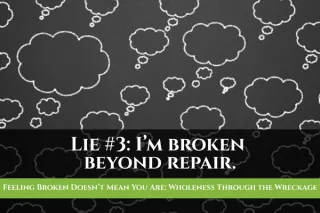
When Joy Feels Dangerous: Healing the Fear That Goodness Won’t Last
You smile—but brace for impact. You get close—but start pulling back. Because something inside whispers: This won’t last. But what if joy isn’t the threat—what if it’s the medicine? ...more
50 Lies
July 04, 2025•1 min read

You Are More Than What You Give: Undoing the Lie of Earned Belonging
You’ve been the helper, the healer, the one who always shows up. But under all that kindness is often a quiet fear: If I stop being useful, will anyone still stay? ...more
50 Lies
June 27, 2025•1 min read

You Were Never Too Much—They Just Forgot Their Own Depth
There’s a pain that comes not from rejection—but from being asked to shrink. You begin to believe your fullness is a flaw. But what if the truth is, your “too much” is actually your truest self trying... ...more
50 Lies
June 20, 2025•1 min read

The Measuring Stick Was Never Yours: Undoing the Lie of “Not Enough”
“Not enough” is a sneaky kind of shame. It dresses up as self-improvement, ambition, humility. But underneath it all is a question no one can ever answer for you: Am I okay as I am? ...more
50 Lies
June 13, 2025•1 min read

Feeling Broken Doesn’t Mean You Are: Wholeness Through the Wreckage
Pain can sound like finality. It tells you you’re ruined. Done for. Beyond healing. But what if the ache isn’t the end of your story—but the invitation to remember who you still are? ...more
50 Lies
June 06, 2025•1 min read

The Importance of Active Listening in Relationships
Discover the importance of active listening in relationships and learn practical steps to hone this essential skill. Focus fully, reflect back, and empathize with your partner to enhance communication... ...more
A Year of Relationship Growth
May 31, 2025•3 min read
Josh Kellar Counseling, PLLC
© 2025. All Rights Reserved.
